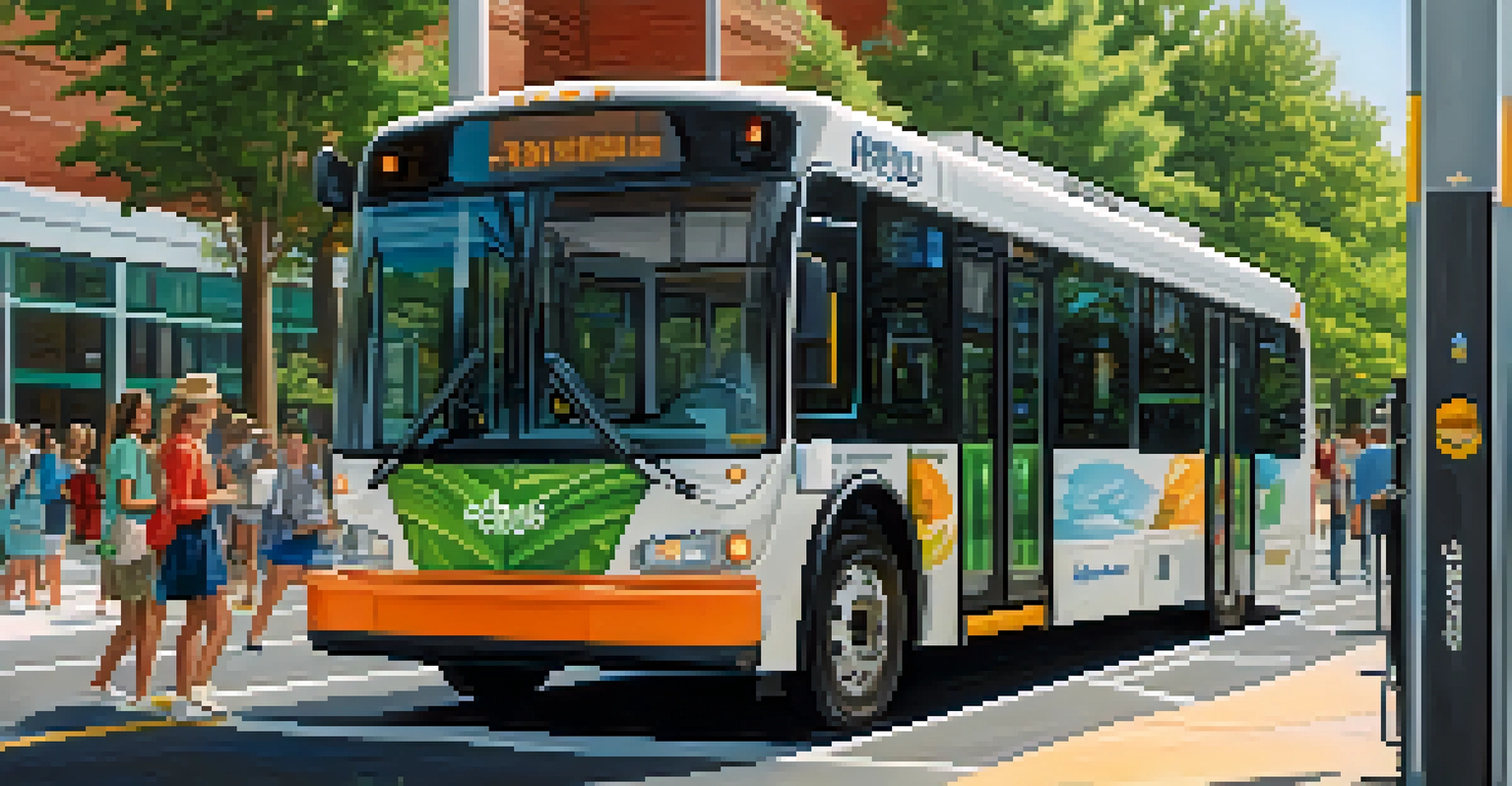The Role of Technology in Charlotte's Transportation System

Introduction to Charlotte's Evolving Transportation Landscape
Charlotte, North Carolina, has seen significant growth in its transportation system, driven by technological advancements. As the city expands, accommodating more residents and businesses, the need for efficient transportation becomes crucial. Technology plays a vital role in enhancing mobility, safety, and convenience for everyone in the community.
A city is not just a place to live, but a place to thrive.
From the development of smart traffic signals to the integration of apps that provide real-time transit information, the city is embracing innovation. These technological solutions are not merely conveniences; they are essential for managing the increasing demand for transportation. As we delve deeper, we will explore how these innovations are reshaping the way people navigate Charlotte.
In this article, we will discuss various technological initiatives and their impact on the transportation system. Our journey will highlight the importance of technology in improving public transit, traffic management, and overall urban mobility in Charlotte.
Smart Traffic Management Systems Enhancing Flow
One of the most significant advancements in Charlotte's transportation is the implementation of smart traffic management systems. These systems utilize sensors and cameras to monitor traffic conditions in real time, allowing for more responsive traffic signal adjustments. This technology helps reduce congestion and improves travel times for commuters.

For instance, during peak hours, traffic signals can change based on actual traffic flow rather than a fixed schedule. This flexibility means that vehicles can move more smoothly through intersections, minimizing idling time and decreasing emissions. As a result, Charlotte's roads become not only more efficient but also friendlier to the environment.
Smart Traffic Systems Improve Flow
Charlotte's adoption of smart traffic management systems enhances real-time traffic flow, reducing congestion and emissions.
Moreover, these systems contribute to safer roadways by reducing the likelihood of accidents caused by heavy traffic. The integration of technology in traffic management is a game-changer for urban transportation, making Charlotte a model for other cities aiming to improve their infrastructure.
Public Transit Innovations for Better Accessibility
Charlotte's public transit system has also undergone a technological transformation aimed at enhancing accessibility and user experience. With the introduction of mobile apps, passengers can easily access real-time arrival information, route planning, and service alerts. This convenience encourages more residents to choose public transit over personal vehicles.
Technology is best when it brings people together.
Additionally, the city has implemented features like contactless payment systems, making it easier and faster for commuters to board buses and light rail trains. By reducing the barriers to using public transportation, Charlotte is promoting a more sustainable transportation culture and helping residents save both time and money.
The focus on innovation in public transit reflects a commitment to inclusivity, ensuring that all residents, regardless of mobility challenges, can navigate the city effectively. As technology continues to evolve, we can expect even more improvements that will further bridge the gap for those who rely on public transportation.
Ride-Sharing and Micro-Mobility Options on the Rise
The rise of ride-sharing services like Uber and Lyft has added another layer of convenience to Charlotte's transportation landscape. These platforms leverage technology to connect riders with drivers quickly, providing an alternative to traditional taxis and public transit. This shift not only enhances mobility but also reduces the number of cars on the road, alleviating congestion.
In addition to ride-sharing, micro-mobility options such as scooters and bikes are becoming increasingly popular in Charlotte. These modes of transport offer a flexible way to navigate short distances, reducing reliance on cars and contributing to a greener city. With dedicated bike lanes and scooter-sharing programs, Charlotte is promoting a culture of active transportation.
Public Transit Embraces Technology
Innovative mobile apps and contactless payments are making Charlotte's public transit more accessible and user-friendly.
As we embrace these modern transportation solutions, it's essential to consider how they can integrate with existing systems. The combination of ride-sharing and micro-mobility creates a seamless transit experience, encouraging residents to explore different ways to get around without the hassle of parking or traffic.
The Role of Data Analytics in Transportation Planning
Data analytics has become a cornerstone of effective transportation planning in Charlotte. By analyzing traffic patterns, ridership statistics, and environmental impact, city planners can make informed decisions about where to invest resources. This data-driven approach ensures that transportation initiatives align with community needs and growth projections.
For example, by examining data from public transit usage, planners can identify which routes require enhancements or additional services. This targeted approach not only optimizes existing resources but also maximizes the benefits for residents. As a result, transportation planning becomes more proactive rather than reactive.
Furthermore, the integration of data analytics with other technologies, such as smart traffic signals, creates a feedback loop that continuously improves the transportation system. By harnessing the power of data, Charlotte is paving the way for a more efficient and responsive transportation infrastructure.
Sustainable Transportation Initiatives Taking Shape
In response to growing environmental concerns, Charlotte is actively pursuing sustainable transportation initiatives. The city has committed to reducing greenhouse gas emissions by promoting electric vehicles (EVs) and expanding charging infrastructure. This shift not only benefits the environment but also encourages residents to make greener choices.
Moreover, public transit is being enhanced with electric buses, which are quieter and produce fewer emissions compared to traditional diesel buses. This transition is critical for improving air quality and reducing the city's carbon footprint. As more residents opt for sustainable transportation options, Charlotte moves closer to its environmental goals.
Sustainability Drives Transportation Plans
Charlotte is pursuing sustainable initiatives, including electric vehicles and public transit enhancements, to reduce its environmental impact.
These initiatives demonstrate the city's dedication to creating a more livable and eco-friendly urban environment. By integrating technology with sustainability efforts, Charlotte is setting a precedent for other cities looking to balance growth with environmental responsibility.
Future Innovations on the Horizon for Transportation
As technology continues to advance, the future of Charlotte's transportation system looks promising. Initiatives such as autonomous vehicles and smart city technologies are on the cusp of becoming a reality. These innovations could revolutionize how we navigate urban spaces, making transportation even more efficient and safe.
For instance, autonomous vehicles have the potential to reduce traffic accidents caused by human error, which is a significant factor in many crashes. As this technology develops, it could lead to safer streets and a decrease in insurance costs for drivers. Furthermore, the integration of smart city technologies will enhance communication between vehicles and infrastructure, improving overall traffic management.

The excitement surrounding these future innovations reflects a broader trend of cities embracing technology to solve transportation challenges. As Charlotte continues to invest in these advancements, residents can look forward to a more connected and efficient transportation experience.
Conclusion: Embracing Technology for a Better Tomorrow
In conclusion, technology plays a pivotal role in shaping Charlotte's transportation system. From smart traffic management to innovative public transit solutions, these advancements are making it easier and safer for residents to move around the city. As Charlotte grows, the integration of technology will be key to ensuring that transportation keeps pace with urban development.
Moreover, the focus on sustainability within these technological initiatives highlights a commitment to the environment and a better quality of life for all. By encouraging greener transportation options and utilizing data-driven planning, Charlotte is setting a standard for responsible urban development.
As we look ahead, it is clear that the future of transportation in Charlotte is bright. With continued investment in technology and a focus on community needs, we can expect a transportation system that not only meets the demands of today but also paves the way for a sustainable tomorrow.